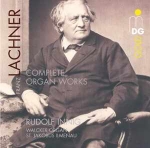
MDG 317 1487-2
Rudolf Innig, Walcker Orgel,
Stadtkirche St. Jakobus Ilmenau
Franz Paul Lachner Complete Organ Works
Prelude and Fugue (1856) B minor / si mineur / h-Moll
Sonata op. 175 (1877) F minor / fa mineur / f-Moll Fugue
F major / fa majeur / F-Dur
Sonata op. 176 (1877) C major / ut majeur / C-Dur
Prelude and Fugue E major/minor / mi majeur/mineur / E-Dur/Moll
Sonata op. 177 (1877) E minor / mi mineur / e-Moll
Excerpts from the booklet
My interest in Franz Lachner’s organ music developed in connection with my recording of Joseph Gabriel Rheinberger’s organ works, a project extending from 1998 to 2005. Who was Rheinberger’s composition teacher Franz Lachner, to whom his parents (his father was what amounted to the Minister of Finance in the principality of Liechtenstein) entrusted their child prodigy in Munich in 1851, when he was twelve years old, and with whom he was able only to receive private instruction in composition because the esteemed general music director of the Munich Court Opera was not a faculty member at any public conservatory? Who was this musician who today has almost entirely been forgotten? (Rudolf Innig)
Excerpts from the reviews
„Überaus geschmackvoll dosiert Rudolf Innig den grundtönigen Orgelklang, der im ausdrucksvollen Schwellwerk auch französische Einflüsse des Orgelbaus in den spezifischen klanglichen Einfärbungen verrät. In den Plenum – Abschnitten bringt Innig eine feine Agogik zur Wirkung und meidet hier knallig – durchschlagende Registrierungen. Die hervorragend gelungene Einspielung dokumentiert den künstlerischen Rang von Rudolf Innig, sein souveränes Können und sensibles Klangempfinden.“ (Klassik.Com, 2008)
„Rudolf Innig plays the monumental Walcker organ in the Ilmenau Town Church, a brilliant and breathtaking instrument which brings these works to life in sonorous and rather splendid sound. The organist’s scholarly essay is also a true gold mine of information on Lachner and his works. Organ enthusiasts should not hesitate to snap up this fine collection.” (Classical.net, 2008)
“Le premier contact avec l’interprétation de Rudolf Innig séduit: il sait incontestablement établir une atmosphère, tant par la registration que par un rubato qu’il veut constamment expressif. (Diapason, 2009)

